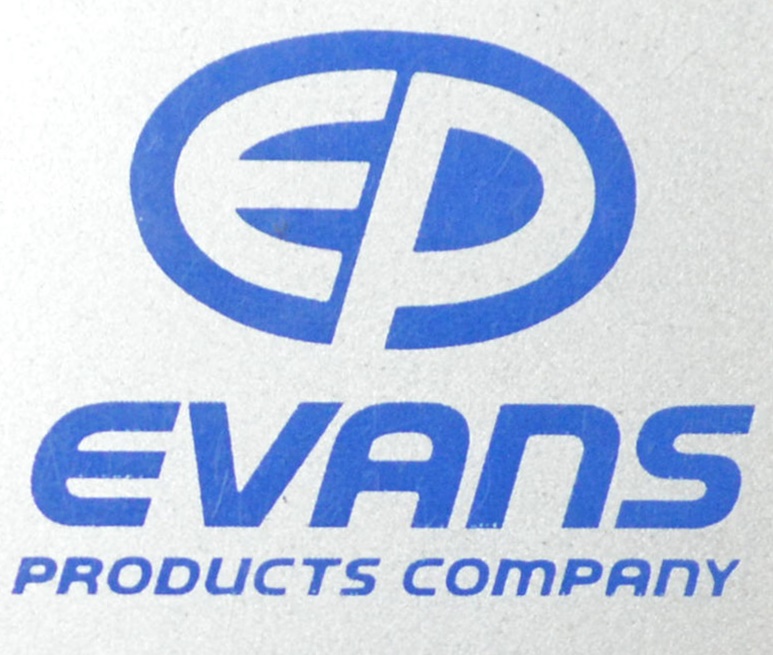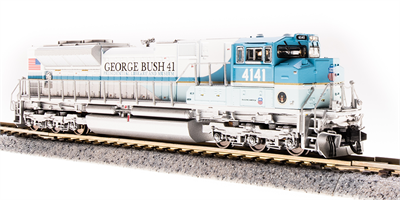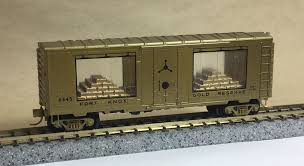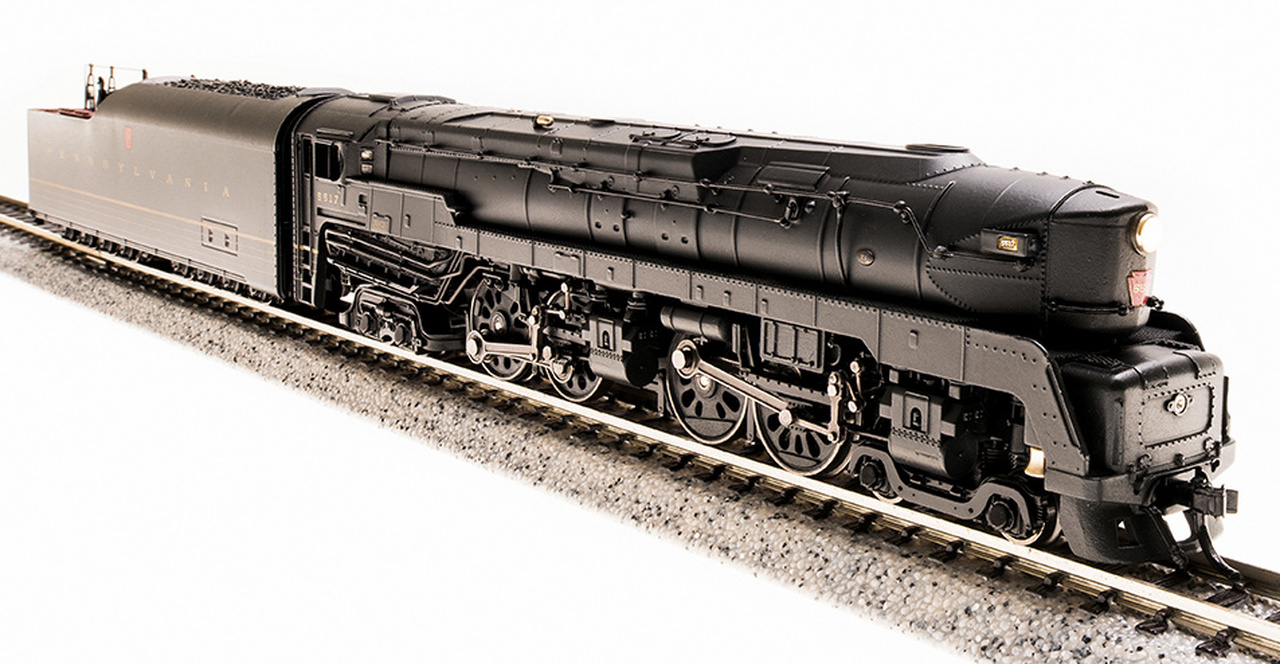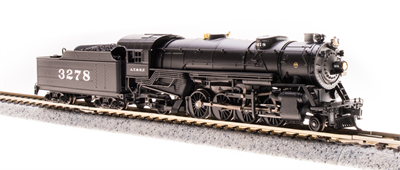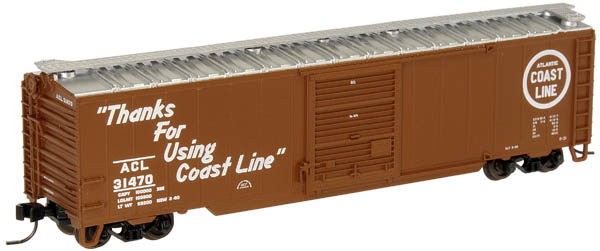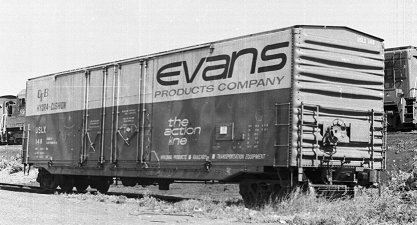Model Information: Life-Like worked with Sanda Kan to develop this tooling as part of Life-Like's push to move all production of rolling stock to China in the 1990s. As was common at the time, the ownership of the tooling was controlled by Sanda Kan which took advantage of this to manufacture this model for Industrial Rail as well as Life-Like. It has also been sold/decorated by Con-Cor, Bev-Bel and Eastern Seaboard Models, though I do not know if any of these other companies purchased the undecorated models from Life-Like or Sanda Kan directly.
Unlike many of the other Chinese models of this period, this one does not seem to be a direct copy of any of the earlier European made N Scale models. This series of boxcars models the modern, no-roofwalk 50' Evans high-cube prototype. It has been claimed that the model specifically targets the Penn Central X72 version of the Evans car.
Unlike many of the other Chinese models of this period, this one does not seem to be a direct copy of any of the earlier European made N Scale models. This series of boxcars models the modern, no-roofwalk 50' Evans high-cube prototype. It has been claimed that the model specifically targets the Penn Central X72 version of the Evans car.
Prototype History: With the Per Diem rules implemented by the US government to encourage railroads to purchase more boxcars, boxcar manufacturing roared into gear in the 1970s. Every major manufacturer cranked out 50 foot boxcars to satisfy the demand. Evans was no exception. Empowered by its acquisition of United States Railway Equipment (USRE), Evans-USRE boxcars became ubiquitous during the IPD boxcar boom of the 1970s. With modern upgrades such as box-corrugated, non-terminating ends, Stanray X-panel overhanging roof, and riveted car sides near the end posts, the Evans-USRE 5277 is a classic boxcar of the IPD era.
The former Evans railcar repair facility in Springfield OR is now owned/operated by Gunderson.
The former Evans railcar repair facility in Springfield OR is now owned/operated by Gunderson.
Road Name History: 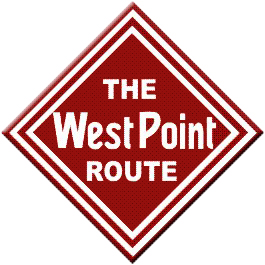 Also know as the 'Western of Alabama', The Western Railway of Alabama was formed in 1883 as a result of the reorganization of the Western Rail Road of Alabama and was converted from 5’ gauge to standard gauge in 1886. This pocket size Class 1 railroad linked Selma and Montgomery, Alabama with West Point just over the Georgia border 133 miles to the east. There they connected with their sister road Atlanta & West Point. The two roads together were referred to as "The West Point Route" and were closely affiliated with the Georgia Railroad. Locomotives from the three companies moved freely across each other’s lines.
Also know as the 'Western of Alabama', The Western Railway of Alabama was formed in 1883 as a result of the reorganization of the Western Rail Road of Alabama and was converted from 5’ gauge to standard gauge in 1886. This pocket size Class 1 railroad linked Selma and Montgomery, Alabama with West Point just over the Georgia border 133 miles to the east. There they connected with their sister road Atlanta & West Point. The two roads together were referred to as "The West Point Route" and were closely affiliated with the Georgia Railroad. Locomotives from the three companies moved freely across each other’s lines.
WoA relied heavily on 4-6-0’s in the early part of the 20th century but would later build up a fleet of seven Mikados for freight service and four Pacifics for passenger service. The biggest power on the WoA consisted of five 4-8-2 mountains, three of which were former Florida East Coast engines that were repossessed by the bank during the Depression. WoA’s first diesels were switchers from Baldwin but it was EMD that would earn all of WoA’s road service locomotives until the end.
WoA hosted Southern Railway’s Crescent Limited between West Point and Montgomery for most of that train’s history.
Western of Alabama, Atlanta & West Point and Georgia Railroad were controlled jointly by L&N and Atlantic Coast Line (SCL after 1967.) As such, Western of Alabama was one of the "Family Lines." In 1983, all of the Family Lines roads were merged to form Seaboard System. Traffic was relatively heavy and the route continues today to be an important line in the CSX system.
Text Courtesy of Bluford Shops

WoA relied heavily on 4-6-0’s in the early part of the 20th century but would later build up a fleet of seven Mikados for freight service and four Pacifics for passenger service. The biggest power on the WoA consisted of five 4-8-2 mountains, three of which were former Florida East Coast engines that were repossessed by the bank during the Depression. WoA’s first diesels were switchers from Baldwin but it was EMD that would earn all of WoA’s road service locomotives until the end.
WoA hosted Southern Railway’s Crescent Limited between West Point and Montgomery for most of that train’s history.
Western of Alabama, Atlanta & West Point and Georgia Railroad were controlled jointly by L&N and Atlantic Coast Line (SCL after 1967.) As such, Western of Alabama was one of the "Family Lines." In 1983, all of the Family Lines roads were merged to form Seaboard System. Traffic was relatively heavy and the route continues today to be an important line in the CSX system.
Text Courtesy of Bluford Shops
Brand/Importer Information:  Formerly located in Cresskill, New Jersey, the now defunct Bev-Bel Corp. was founded by the late Irvin and Beverly Belkin in 1956. A prolific "boutique" producer of after-market, limited production, special run rolling stock and locomotives (in road names and non-traditional commemorative and holiday themed paint schemes that were not typically offered by the major manufacturers), Bev-Bel' sourced its models from Atlas Tool Co., Inc., Atlas Model Railroad Co., Inc., Bachmann, and Life-Like Trains.
Formerly located in Cresskill, New Jersey, the now defunct Bev-Bel Corp. was founded by the late Irvin and Beverly Belkin in 1956. A prolific "boutique" producer of after-market, limited production, special run rolling stock and locomotives (in road names and non-traditional commemorative and holiday themed paint schemes that were not typically offered by the major manufacturers), Bev-Bel' sourced its models from Atlas Tool Co., Inc., Atlas Model Railroad Co., Inc., Bachmann, and Life-Like Trains.

Manufacturer Information:  Established in 1973, Sanda Kan was originally a venture (subsidiary?) of Life-Like products. In 1979, Mr. Wai Shing Ting, formerly of Cox Hong Kong, joined Sanda Kan and took over as de facto CEO. At some point ownership of the venture changed hands and Mr. Ting became the primary owner. In 2000, Ting sold Sanda Kan to ZS Fund. The company was later resold to Kader Holdings, the venerable Hong Kong based toy manufacturer. The original location of the Sanda Kan facility was in Hong Kong, but after the liberalization of the mainland Chinese economy, the primary manufacturing site moved to Guang Dong (Canton), while the administrative offices appear to have remained in Hong Kong. At its height, Sanda Kan operated in 10 factories across Guang Dong with over 10,000 employees in 1.2 million square feet of space.
Established in 1973, Sanda Kan was originally a venture (subsidiary?) of Life-Like products. In 1979, Mr. Wai Shing Ting, formerly of Cox Hong Kong, joined Sanda Kan and took over as de facto CEO. At some point ownership of the venture changed hands and Mr. Ting became the primary owner. In 2000, Ting sold Sanda Kan to ZS Fund. The company was later resold to Kader Holdings, the venerable Hong Kong based toy manufacturer. The original location of the Sanda Kan facility was in Hong Kong, but after the liberalization of the mainland Chinese economy, the primary manufacturing site moved to Guang Dong (Canton), while the administrative offices appear to have remained in Hong Kong. At its height, Sanda Kan operated in 10 factories across Guang Dong with over 10,000 employees in 1.2 million square feet of space.
Sanda Kan is a highly recognized developer and manufacturer of precision models. It produces a full range of model train locomotives, from the very small 1:220 scale to the large 1:22 scale products. Other hobby items include electronic slot racing cars, sophisticated digital controls as well as accessories such as scenery, promotional cars and trucks. It continues to work closely with some of the world’s leading brands from concept to mold construction through to final production.
Sanda Kan’s unique structure allows for maximum flexibility. Its production facilities are located in Songgang, Shenzhen and Wanjiang, Dongguan. Each location is outfitted with mould shops providing full service on-site mould construction and maintenance. Both locations are also sub-divided into individual factories capable of manufacturing complete products, which are comprehensively equipped with injection moulding machines, tempo printing and spraying facilities, and dedicated assembly lines. This arrangement provides our clients with the dedicated capacity, service and privacy levels that they may require.
In 2008, Sanda Kan was acquired by Kader Holdings, the parent company of Bachmann and Tinco, but remains in operation producing model trains for numerous clients including: Atlas, Lionel, Aristo-Craft, Micro-Ace, S-Helper, Hornby, Brawa, Marklin and Tomix.
For more on Sanda Kan and Mr. Wai Shing Ting, please visit the Atlas Model Trains article on Wai Shing Ting.

Sanda Kan is a highly recognized developer and manufacturer of precision models. It produces a full range of model train locomotives, from the very small 1:220 scale to the large 1:22 scale products. Other hobby items include electronic slot racing cars, sophisticated digital controls as well as accessories such as scenery, promotional cars and trucks. It continues to work closely with some of the world’s leading brands from concept to mold construction through to final production.
Sanda Kan’s unique structure allows for maximum flexibility. Its production facilities are located in Songgang, Shenzhen and Wanjiang, Dongguan. Each location is outfitted with mould shops providing full service on-site mould construction and maintenance. Both locations are also sub-divided into individual factories capable of manufacturing complete products, which are comprehensively equipped with injection moulding machines, tempo printing and spraying facilities, and dedicated assembly lines. This arrangement provides our clients with the dedicated capacity, service and privacy levels that they may require.
In 2008, Sanda Kan was acquired by Kader Holdings, the parent company of Bachmann and Tinco, but remains in operation producing model trains for numerous clients including: Atlas, Lionel, Aristo-Craft, Micro-Ace, S-Helper, Hornby, Brawa, Marklin and Tomix.
For more on Sanda Kan and Mr. Wai Shing Ting, please visit the Atlas Model Trains article on Wai Shing Ting.
Item created by: Alain LM on 2017-09-09 15:24:48. Last edited by meadowsn1956 on 2020-06-24 20:22:51
If you see errors or missing data in this entry, please feel free to log in and edit it. Anyone with a Gmail account can log in instantly.
If you see errors or missing data in this entry, please feel free to log in and edit it. Anyone with a Gmail account can log in instantly.



